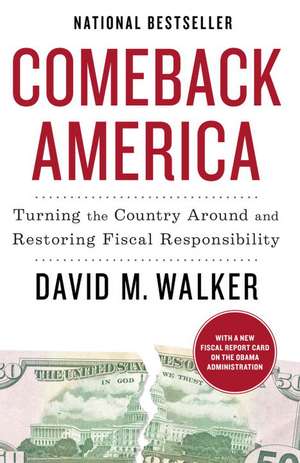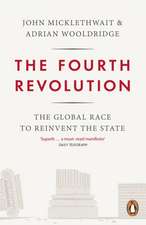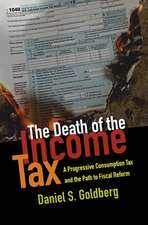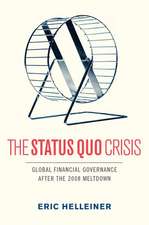Comeback America: Turning the Country Around and Restoring Fiscal Responsibility
Autor David M. Walkeren Limba Engleză Paperback – 31 aug 2010
As comptroller general of the United States and head of the Government Accountability Office (GAO)—"the nation's top auditor"—Walker warned Congress and the administration as the federal surplus became a giant deficit under George W. Bush. As president and CEO of the Peter G. Peterson Foundation, he now works full-time to raise public awareness regarding mounting debt burdens being imposed on future generations. Comeback America is his crucial manifesto, a way for President Obama to end out-of-control government spending and reform our tax, retirement, health care, defense, and other systems—before it's too late.
Walker believes that by 2030, absent significant reforms to current government programs and policies, federal taxes could double from current levels, meaning less money and poorer education for kids—which will hurt families along with our nation's economic strength and position in the world. If our foreign creditors—such as China—decide to buy fewer of our Treasury bonds, interest rates will rise and cars and homes will become less affordable.
But it doesn't have to be that way. Comeback America shows how we can return to our founding principles of fiscal responsibility and stewardship for future generations. The book includes bold ideas to control spending, save Social Security, dramatically alter Medicare, and simplify the tax code—all taking into account the Obama Administration's current efforts, which receive never-before-published assessments both complimentary and critical.
Nonpartisan, nonideological, and filled with a love of the country its esteemed author has spent his life serving, Comeback America is a book for anyone interested in America's economic future—in other words, a book everyone should read.
Preț: 100.57 lei
Nou
Puncte Express: 151
Preț estimativ în valută:
19.25€ • 20.02$ • 15.89£
19.25€ • 20.02$ • 15.89£
Carte disponibilă
Livrare economică 25 martie-08 aprilie
Preluare comenzi: 021 569.72.76
Specificații
ISBN-13: 9780812980721
ISBN-10: 0812980727
Pagini: 252
Ilustrații: 11 GRAPHS
Dimensiuni: 135 x 202 x 15 mm
Greutate: 0.21 kg
Editura: Random House Trade
ISBN-10: 0812980727
Pagini: 252
Ilustrații: 11 GRAPHS
Dimensiuni: 135 x 202 x 15 mm
Greutate: 0.21 kg
Editura: Random House Trade
Notă biografică
David M. Walker served as the seventh comptroller general of the United States and was the CEO of the U.S. Government Accountability Office (GAO) from 1998 to 2008. Currently the president and CEO of the Peter G. Peterson Foundation, Walker is a frequent speaker, writer, commentator, and congressional witness. He has appeared on a significant number of television networks, cable channels, and radio programs and has written for many major publications.
From the Hardcover edition.
From the Hardcover edition.
Extras
FISCAL CRISIS 101
When you give a speech, you're usually trying to deliver a few applause lines and maybe a laugh or two. But when I went out on the road to talk about America's financial crisis, I counted my talk successful if it induced something else: shocked silence.
It wasn't that hard to pull off. All I had to do was deliver a few jarring facts. "Our country is in a $56 trillion financial hole as of September 30, 2008," I would tell my audiences. "Therefore, if you are part of a typical American family, your household has about $483,000 in debt you probably don't know about." Shocked silence.
"Maybe you have a mortgage on your house," I would continue. "Well, your share of the national IOU is like a huge second or possibly third mortgage, amounting to almost ten times your annual household income-and in this case you don't even have a house to show for it."
I had them hooked.
As I said, it isn't that hard to shock people with the simple facts. Most Americans I encounter simply do not realize how rapidly our national financial obligations have grown-and how far short we are of having adequate resources to deliver on our promises. Our financial condition is as important to our national security as our military strength. Yet many of us don't have a clue about how recklessly our leaders have managed America's finances-and how vulnerable you, I, and our children are as a result.
Some of the questions I get after my speeches show this basic confusion. People ask: Whom do we owe all this money to? And what does it matter that the federal government is in debt? All it has to do is print more money.
Or they ask: If the government's spending improves our lives and promotes economic growth, what does it matter if we have a deficit? The implication is that only a heartless number cruncher-like me, by inference-would work to balance the books by cutting back on government benefits such as Social Security and Medicare.
These are all good questions, especially given how little attention our fiscal health gets in the national conversation. A fiscal crisis doesn't shoot at us. It doesn't stalk our children like a human predator. Nobody has sent each of us a bill for $483,000, and nobody will. No, the enemy I am writing about is quiet, patient, and insidious. It's a danger to our lives right now, but it's an even bigger threat to our future.
We Americans are rightly proud of the idea of the American Dream, that if we work hard and persevere, we will succeed. Each generation takes pride in passing on a better life to the next. But we need to be aware of another possibility, a nightmare in which our nation's growing financial burdens sap our society of the resources we need to maintain our economic, educational, and scientific leadership, to pay for the benefits our less-well-off citizens need, to invest in our children's future, and to maintain our unparalleled influence in the world.
How could some red numbers at the bottom of an income statement or balance sheet actually cause so much damage? Stay with me and I'll show you. I'll start by explaining the key facts of our great fiscal challenge. The goal here is to clear up some of the fog that comes from intentional obfuscation by politicians, as well as just the understandable complexity of a $14 trillion economy.
In essence, the topic of this book is very simple. It's all about how our government collects money, mainly through taxes, and spends it in government operations, programs, and benefits. These decisions on taxing and spending are called fiscal policy, and fiscal policy is all about managing our nation's finances properly. What I'm telling you in this book is that our government has been making these decisions very badly and that we have to get our fiscal house in order. If we don't, the consequences will be grave for us and for our country. But I'll do more than tell you our policies are bad. I'll give you commonsense ideas-solutions from the sensible center-to correct them.
OUR FINANCIAL HOLE
Right now, things don't look so good. Over the past several decades or so, Washington's fiscal policies have put us in that $56 trillion hole I evoke to get my audiences' attention. A lot of bad policies and practices went into creating that hole, and it's worth understanding the worst of them.
First, there's our growing budget deficit. The federal budget is Washington's annual spending list, proposed by the president, then amended and adopted by Congress. In theory it's no different from your household budget. You take account of your spendable income and make sure that your expenses don't exceed it. You borrow for big-ticket items such as a house and car, but you make sure your loan payments fit comfortably within your budget. If your spending gets too high, you had better find a way to bring in more income or you're in trouble.
All of this seems pretty obvious. But not in Washington, where the policy-making establishment often pays little attention to the difference between spending and having the money you need to pay for that spending. Most recently, the coincidence of prosperity and fiscal discipline that produced a balanced federal budget under President Clinton exploded into red ink under his successor, President Bush 43, and continues to explode under President Obama. According to the Office of Management and Budget (OMB), the federal deficit grew from $161 billion in fiscal year 2007 (a fiscal year is measured from October 1 to September 30) to $455 billion in fiscal 2008. The OMB announced in October 2009 that the federal budget deficit in fiscal 2009 was $1.42 trillion, or about 9.9 percent of GDP.
Think about that word, "trillion," if you can. The $1.42 trillion deficit translates to about $2.6 million of debt accumulated each minute, $160 million an hour, and $3.8 billion a day. Think Warren Buffett is rich? His estimated net worth is only about 2.6 percent of that $1.42 trillion.
So we should all write to our congressional representatives and demand that they cut spending enough to balance the budget, right? If only it were that simple. The budget covers two basic kinds of programs. The first are discretionary-that is, the government has full discretion as to whether to fund them and how much to give them. These include all the things that we regard as fundamental when we think about government's role: national security, homeland defense, protecting the environment, building roads, administering justice, circulating money, and so on.
Then there's the other kind of spending in our budget, called mandatory. That's right: The government has no direct control over this spending, because our elected representatives have passed laws guaranteeing benefits to people who qualify for them-such as Social Security, Medicare, and Medicaid. It's either pay the benefits or change the law, and you won't find many politicians with the courage to call for new laws to cut our Social Security, Medicare, or Medicaid costs down to size.
I think you know what's coming next. Here's a quiz: Which budget items soak up most of our government spending: (a) the discretionary programs, or (b) the mandatory programs?
The answer is, the mandatory benefit programs. They took up more than 60 percent of the $3 trillion federal budget for 2008. That means more than $1.8 trillion a year flowed from Washington on autopilot, essentially out of the government's control.
Now, how close do we come to collecting the money we need to pay for this combination of discretionary programs and mandatory spending? You know the answer to that one, too. I've already cited our $1.42 trillion budget shortfall, and this will result in more debt. But our government owes a lot of money in addition to the amounts resulting from this year's budget. It has long-term commitments to federal civilian and military retirees and to various building leases and maintenance, among other things. It also owes money to various trust funds, including the ones supporting Social Security (more on that scam later in the book). And the federal government has trillions of commitments and guarantees in response to the recent financial crisis.
Most significant, it owes money to all the domestic and foreign investors who purchased U.S. Treasury bonds in order to finance our past deficits. When you buy a Treasury bond, you are essentially lending that money to the federal government. The government must pay you back-with interest.
These obligations add to the nation's total federal debt, which includes debt held by the public (domestic and foreign investors) and debt held by the trust funds (primarily for Social Security and Medicare). That federal debt almost doubled during Bush 43's presidency and has kept on growing. As of September 30, 2009, total federal debt stood at more than $11.9 trillion. Based on the projected deficits and Social Security operations in President Obama's fiscal 2010 budget proposal and longer-range outlook, our total federal debt could double again during the next eight to ten years if we don't change our fiscal course soon.
Add debt held by the public to other liabilities-like pensions, retiree health care, and leases-and you get $12.2 trillion in total federal liabilities as of September 30, 2008. Then there are other commitments and contingencies that bring the total to $13.5 trillion. That's a lot, right?
Brace yourself. That's not the half of it. Remember those mandatory payments to Americans qualifying for government benefits of one kind or another? Well, those payments will go higher and higher as the baby boomers retire, and guess what? They haven't been funded to account for this demographic reality. We have promised trillions and trillions to recipients of Social Security, Medicare, and other programs, but we are collecting nowhere near enough in taxes and other revenues to pay what we will owe.
The idea of measuring these so-called unfunded obligations is relatively new in government accounting-probably because the number is so scary that nobody wanted to know it. It's the "don't ask, don't tell" fiscal policy. Well, here it is: Our government's unfunded obligations as of September 30, 2008, totaled approximately $42.9 trillion. Take the $13.5 trillion figure from above and add the $42.9 trillion in unfunded obligations and you have that $56 trillion hole that's been reducing my audiences to shocked silence-in fact, it was $56.4 trillion as of September 30, 2008.
And that hole is continuing to get deeper. The $56.4 trillion in total liabilities and unfunded promises as of September 30, 2008, is almost three times what it was in 2000. As I write this, the number as of September 30, 2009, is expected to be at least $63 trillion, and it is rising every second of every day-on autopilot. Why? Because of interest costs and the fact that the unfunded obligations for the Social Security and Medicare programs get worse with the passage of time.
It's almost impossible to come to terms with an obligation that big. "If you spent a million dollars a day going back to the birth of Christ," Representative Darrell E. Issa (R) of California suggested in The New York Times (in another context), "that wouldn't even come close to just one trillion dollars."
The unreality of the numbers lends a kind of unreality to the crisis. As the questioners in my audiences ask, whom exactly do we owe this money to? And what happens if we don't pay it? Nobody is going to lock the president and Congress into a debtors' prison. The short answer is that these obligations are real. We owe the money to Americans who expect to receive promised social benefits, Americans who work for our government and military, and Americans and foreigners who invest in Treasury bonds. Nobody's going to end up in a debtors' prison. But I will try to convince you in this book that unless we come to terms with these obligations, we will pass them on to the next generation, condemning our children to be the first Americans to face a bleaker future than their parents did.
Why can't our government cover all these obligations simply by printing more money? The short answer is that it would cheapen the U.S. dollar, weaken America's standing in the world, and touch off the kind of dramatic inflation we haven't seen in this country since the oil shocks of the 1970s-issues that I will analyze in later chapters. And don't forget, inflation is the cruelest tax of all, because you have no control over it and yet it reduces your effective purchasing power. The combined Medicare, Medicaid, and Social Security programs are growing faster than inflation.
We know what happens to countries that let their fiscal problems get out of control. I began writing this book in December 2008, on a sightseeing trip to Antarctica by way of several South American ports of call. While other passengers were worrying about icebergs, I was chilled by the ghosts of badly handled budgets past.
We stopped for a day in Buenos Aires. Argentina has been one of the most prosperous nations in Latin America, yet it has never achieved its share of economic power or influence. It has already gone bankrupt once and appeared to be heading toward its second bankruptcy. Argentineans seemed to shrug about this, as if they had no control over their fiscal disaster. I was told of an Argentine saying: "A dollar borrowed is a dollar earned." You may find yourself shaking your head at this lack of financial discipline, but the fact is that on a national level, at least, we're just as irresponsible.
HOW WE GOT HERE
In important ways, our government's fiscal policy reflects our own attitudes as citizens. Americans will never fall in love with high taxes, nor should they. The era of the tax revolt gathered steam under President Reagan in the 1980s, when we began to cut taxes and increase spending almost as a matter of political theology. That persistent antigovernment, antitax strain in our national character threatens to keep total revenues from rising high enough to match our spending.
And our spending habits, beginning in these same years, got out of control. After feasting on easy credit for so long, a culture of debt replaced the traditional American culture of thrift. Our political representatives, rather than moderating our excesses, encouraged them with low taxes and generous government benefits. Political gamesmanship replaced sound policy making. The lack of long-range planning built into our governmental system contributed to the excesses.
We all know how these excesses came to a head. The 2008-09 financial crisis, which sent our economy plummeting into recession, came after the bursting of a massive housing bubble. In the boom years leading up to that bust, big lenders got fat on profits from issuing mortgages to "subprime" borrowers-that is, to people who couldn't afford them. When the borrowers predictably defaulted, destroying all the exotic securities based on those mortgages, we received a terrifying lesson on the dangers of excess debt. Did policy makers in Washington learn that lesson?
It doesn't seem so far that they have. There are disturbing parallels between the strategies followed by the financial corporations that either crashed or required bailouts in the subprime crisis and the way our government has been behaving in recent years. Let's look at four of them.
From the Hardcover edition.
When you give a speech, you're usually trying to deliver a few applause lines and maybe a laugh or two. But when I went out on the road to talk about America's financial crisis, I counted my talk successful if it induced something else: shocked silence.
It wasn't that hard to pull off. All I had to do was deliver a few jarring facts. "Our country is in a $56 trillion financial hole as of September 30, 2008," I would tell my audiences. "Therefore, if you are part of a typical American family, your household has about $483,000 in debt you probably don't know about." Shocked silence.
"Maybe you have a mortgage on your house," I would continue. "Well, your share of the national IOU is like a huge second or possibly third mortgage, amounting to almost ten times your annual household income-and in this case you don't even have a house to show for it."
I had them hooked.
As I said, it isn't that hard to shock people with the simple facts. Most Americans I encounter simply do not realize how rapidly our national financial obligations have grown-and how far short we are of having adequate resources to deliver on our promises. Our financial condition is as important to our national security as our military strength. Yet many of us don't have a clue about how recklessly our leaders have managed America's finances-and how vulnerable you, I, and our children are as a result.
Some of the questions I get after my speeches show this basic confusion. People ask: Whom do we owe all this money to? And what does it matter that the federal government is in debt? All it has to do is print more money.
Or they ask: If the government's spending improves our lives and promotes economic growth, what does it matter if we have a deficit? The implication is that only a heartless number cruncher-like me, by inference-would work to balance the books by cutting back on government benefits such as Social Security and Medicare.
These are all good questions, especially given how little attention our fiscal health gets in the national conversation. A fiscal crisis doesn't shoot at us. It doesn't stalk our children like a human predator. Nobody has sent each of us a bill for $483,000, and nobody will. No, the enemy I am writing about is quiet, patient, and insidious. It's a danger to our lives right now, but it's an even bigger threat to our future.
We Americans are rightly proud of the idea of the American Dream, that if we work hard and persevere, we will succeed. Each generation takes pride in passing on a better life to the next. But we need to be aware of another possibility, a nightmare in which our nation's growing financial burdens sap our society of the resources we need to maintain our economic, educational, and scientific leadership, to pay for the benefits our less-well-off citizens need, to invest in our children's future, and to maintain our unparalleled influence in the world.
How could some red numbers at the bottom of an income statement or balance sheet actually cause so much damage? Stay with me and I'll show you. I'll start by explaining the key facts of our great fiscal challenge. The goal here is to clear up some of the fog that comes from intentional obfuscation by politicians, as well as just the understandable complexity of a $14 trillion economy.
In essence, the topic of this book is very simple. It's all about how our government collects money, mainly through taxes, and spends it in government operations, programs, and benefits. These decisions on taxing and spending are called fiscal policy, and fiscal policy is all about managing our nation's finances properly. What I'm telling you in this book is that our government has been making these decisions very badly and that we have to get our fiscal house in order. If we don't, the consequences will be grave for us and for our country. But I'll do more than tell you our policies are bad. I'll give you commonsense ideas-solutions from the sensible center-to correct them.
OUR FINANCIAL HOLE
Right now, things don't look so good. Over the past several decades or so, Washington's fiscal policies have put us in that $56 trillion hole I evoke to get my audiences' attention. A lot of bad policies and practices went into creating that hole, and it's worth understanding the worst of them.
First, there's our growing budget deficit. The federal budget is Washington's annual spending list, proposed by the president, then amended and adopted by Congress. In theory it's no different from your household budget. You take account of your spendable income and make sure that your expenses don't exceed it. You borrow for big-ticket items such as a house and car, but you make sure your loan payments fit comfortably within your budget. If your spending gets too high, you had better find a way to bring in more income or you're in trouble.
All of this seems pretty obvious. But not in Washington, where the policy-making establishment often pays little attention to the difference between spending and having the money you need to pay for that spending. Most recently, the coincidence of prosperity and fiscal discipline that produced a balanced federal budget under President Clinton exploded into red ink under his successor, President Bush 43, and continues to explode under President Obama. According to the Office of Management and Budget (OMB), the federal deficit grew from $161 billion in fiscal year 2007 (a fiscal year is measured from October 1 to September 30) to $455 billion in fiscal 2008. The OMB announced in October 2009 that the federal budget deficit in fiscal 2009 was $1.42 trillion, or about 9.9 percent of GDP.
Think about that word, "trillion," if you can. The $1.42 trillion deficit translates to about $2.6 million of debt accumulated each minute, $160 million an hour, and $3.8 billion a day. Think Warren Buffett is rich? His estimated net worth is only about 2.6 percent of that $1.42 trillion.
So we should all write to our congressional representatives and demand that they cut spending enough to balance the budget, right? If only it were that simple. The budget covers two basic kinds of programs. The first are discretionary-that is, the government has full discretion as to whether to fund them and how much to give them. These include all the things that we regard as fundamental when we think about government's role: national security, homeland defense, protecting the environment, building roads, administering justice, circulating money, and so on.
Then there's the other kind of spending in our budget, called mandatory. That's right: The government has no direct control over this spending, because our elected representatives have passed laws guaranteeing benefits to people who qualify for them-such as Social Security, Medicare, and Medicaid. It's either pay the benefits or change the law, and you won't find many politicians with the courage to call for new laws to cut our Social Security, Medicare, or Medicaid costs down to size.
I think you know what's coming next. Here's a quiz: Which budget items soak up most of our government spending: (a) the discretionary programs, or (b) the mandatory programs?
The answer is, the mandatory benefit programs. They took up more than 60 percent of the $3 trillion federal budget for 2008. That means more than $1.8 trillion a year flowed from Washington on autopilot, essentially out of the government's control.
Now, how close do we come to collecting the money we need to pay for this combination of discretionary programs and mandatory spending? You know the answer to that one, too. I've already cited our $1.42 trillion budget shortfall, and this will result in more debt. But our government owes a lot of money in addition to the amounts resulting from this year's budget. It has long-term commitments to federal civilian and military retirees and to various building leases and maintenance, among other things. It also owes money to various trust funds, including the ones supporting Social Security (more on that scam later in the book). And the federal government has trillions of commitments and guarantees in response to the recent financial crisis.
Most significant, it owes money to all the domestic and foreign investors who purchased U.S. Treasury bonds in order to finance our past deficits. When you buy a Treasury bond, you are essentially lending that money to the federal government. The government must pay you back-with interest.
These obligations add to the nation's total federal debt, which includes debt held by the public (domestic and foreign investors) and debt held by the trust funds (primarily for Social Security and Medicare). That federal debt almost doubled during Bush 43's presidency and has kept on growing. As of September 30, 2009, total federal debt stood at more than $11.9 trillion. Based on the projected deficits and Social Security operations in President Obama's fiscal 2010 budget proposal and longer-range outlook, our total federal debt could double again during the next eight to ten years if we don't change our fiscal course soon.
Add debt held by the public to other liabilities-like pensions, retiree health care, and leases-and you get $12.2 trillion in total federal liabilities as of September 30, 2008. Then there are other commitments and contingencies that bring the total to $13.5 trillion. That's a lot, right?
Brace yourself. That's not the half of it. Remember those mandatory payments to Americans qualifying for government benefits of one kind or another? Well, those payments will go higher and higher as the baby boomers retire, and guess what? They haven't been funded to account for this demographic reality. We have promised trillions and trillions to recipients of Social Security, Medicare, and other programs, but we are collecting nowhere near enough in taxes and other revenues to pay what we will owe.
The idea of measuring these so-called unfunded obligations is relatively new in government accounting-probably because the number is so scary that nobody wanted to know it. It's the "don't ask, don't tell" fiscal policy. Well, here it is: Our government's unfunded obligations as of September 30, 2008, totaled approximately $42.9 trillion. Take the $13.5 trillion figure from above and add the $42.9 trillion in unfunded obligations and you have that $56 trillion hole that's been reducing my audiences to shocked silence-in fact, it was $56.4 trillion as of September 30, 2008.
And that hole is continuing to get deeper. The $56.4 trillion in total liabilities and unfunded promises as of September 30, 2008, is almost three times what it was in 2000. As I write this, the number as of September 30, 2009, is expected to be at least $63 trillion, and it is rising every second of every day-on autopilot. Why? Because of interest costs and the fact that the unfunded obligations for the Social Security and Medicare programs get worse with the passage of time.
It's almost impossible to come to terms with an obligation that big. "If you spent a million dollars a day going back to the birth of Christ," Representative Darrell E. Issa (R) of California suggested in The New York Times (in another context), "that wouldn't even come close to just one trillion dollars."
The unreality of the numbers lends a kind of unreality to the crisis. As the questioners in my audiences ask, whom exactly do we owe this money to? And what happens if we don't pay it? Nobody is going to lock the president and Congress into a debtors' prison. The short answer is that these obligations are real. We owe the money to Americans who expect to receive promised social benefits, Americans who work for our government and military, and Americans and foreigners who invest in Treasury bonds. Nobody's going to end up in a debtors' prison. But I will try to convince you in this book that unless we come to terms with these obligations, we will pass them on to the next generation, condemning our children to be the first Americans to face a bleaker future than their parents did.
Why can't our government cover all these obligations simply by printing more money? The short answer is that it would cheapen the U.S. dollar, weaken America's standing in the world, and touch off the kind of dramatic inflation we haven't seen in this country since the oil shocks of the 1970s-issues that I will analyze in later chapters. And don't forget, inflation is the cruelest tax of all, because you have no control over it and yet it reduces your effective purchasing power. The combined Medicare, Medicaid, and Social Security programs are growing faster than inflation.
We know what happens to countries that let their fiscal problems get out of control. I began writing this book in December 2008, on a sightseeing trip to Antarctica by way of several South American ports of call. While other passengers were worrying about icebergs, I was chilled by the ghosts of badly handled budgets past.
We stopped for a day in Buenos Aires. Argentina has been one of the most prosperous nations in Latin America, yet it has never achieved its share of economic power or influence. It has already gone bankrupt once and appeared to be heading toward its second bankruptcy. Argentineans seemed to shrug about this, as if they had no control over their fiscal disaster. I was told of an Argentine saying: "A dollar borrowed is a dollar earned." You may find yourself shaking your head at this lack of financial discipline, but the fact is that on a national level, at least, we're just as irresponsible.
HOW WE GOT HERE
In important ways, our government's fiscal policy reflects our own attitudes as citizens. Americans will never fall in love with high taxes, nor should they. The era of the tax revolt gathered steam under President Reagan in the 1980s, when we began to cut taxes and increase spending almost as a matter of political theology. That persistent antigovernment, antitax strain in our national character threatens to keep total revenues from rising high enough to match our spending.
And our spending habits, beginning in these same years, got out of control. After feasting on easy credit for so long, a culture of debt replaced the traditional American culture of thrift. Our political representatives, rather than moderating our excesses, encouraged them with low taxes and generous government benefits. Political gamesmanship replaced sound policy making. The lack of long-range planning built into our governmental system contributed to the excesses.
We all know how these excesses came to a head. The 2008-09 financial crisis, which sent our economy plummeting into recession, came after the bursting of a massive housing bubble. In the boom years leading up to that bust, big lenders got fat on profits from issuing mortgages to "subprime" borrowers-that is, to people who couldn't afford them. When the borrowers predictably defaulted, destroying all the exotic securities based on those mortgages, we received a terrifying lesson on the dangers of excess debt. Did policy makers in Washington learn that lesson?
It doesn't seem so far that they have. There are disturbing parallels between the strategies followed by the financial corporations that either crashed or required bailouts in the subprime crisis and the way our government has been behaving in recent years. Let's look at four of them.
From the Hardcover edition.
Recenzii
"Please read this book by David Walker. No one has worked harder, been armed with more facts, written more clearly and been more dedicated to the mission of restoring confidence in our fiscal affairs and trust in government." —Paul Volcker, Chairman of the Economic Recovery Advisory Board and Former Chairman of the Federal Reserve
"Dave Walker has lifted the hood on the federal government, diagnosed the problems, and provided a number of sensible suggestions to help restore America's greatness. READ THIS BOOK IF YOU CARE ABOUT AMERICA’S FUTURE."—Ross Perot
"David Walker shows us how to regain fiscal sanity and why, if we don't, we're at risk of bequeathing a lower standard of living to our children and becoming a second rate power. Every American should read this book because Walker gives us specific solutions, and shows there is still hope."—Former U.S. Senator Bill Bradley
"DavidWalker has drawn a true frightening and fact-based picture of a looming crisis; a crisis that will make the recent financial meltdown seem like a walk in the park. If this analysis doesn't stir you to action nothing will."—Paul O'Neill, U.S. Secretary of the Treasury under President George W. Bush (43)
"Comeback America is a brilliant, factual, and highly readable account of our current fiscal predicament, how we got there, how we can escape, and what we should do in the future. It is a must read by every American, especially our elected leaders."—Carla Hills, U.S. Trade Representative under President George H.W. Bush (41)
"Every American should read David Walker's clear analysis of our dangerous future federal budget deficits and of our current political system. One might not agree with all of Walker's opinions and recommendations, but they should stimulate serious debate about issues that will determine the future of our society; and hopefully contribute to moving forward on those issues."—Robert Rubin, Co-Chairman, Council on Foreign Relations and Former Secretary of Treasury
“If you're a politician or citizen ready to get a grip—on budgets, spending, entitlement, and health-care reform—the ideas in Comeback America are a good starting point for a discussion.”—Philadelphia Inquirer
From the Hardcover edition.
"Dave Walker has lifted the hood on the federal government, diagnosed the problems, and provided a number of sensible suggestions to help restore America's greatness. READ THIS BOOK IF YOU CARE ABOUT AMERICA’S FUTURE."—Ross Perot
"David Walker shows us how to regain fiscal sanity and why, if we don't, we're at risk of bequeathing a lower standard of living to our children and becoming a second rate power. Every American should read this book because Walker gives us specific solutions, and shows there is still hope."—Former U.S. Senator Bill Bradley
"DavidWalker has drawn a true frightening and fact-based picture of a looming crisis; a crisis that will make the recent financial meltdown seem like a walk in the park. If this analysis doesn't stir you to action nothing will."—Paul O'Neill, U.S. Secretary of the Treasury under President George W. Bush (43)
"Comeback America is a brilliant, factual, and highly readable account of our current fiscal predicament, how we got there, how we can escape, and what we should do in the future. It is a must read by every American, especially our elected leaders."—Carla Hills, U.S. Trade Representative under President George H.W. Bush (41)
"Every American should read David Walker's clear analysis of our dangerous future federal budget deficits and of our current political system. One might not agree with all of Walker's opinions and recommendations, but they should stimulate serious debate about issues that will determine the future of our society; and hopefully contribute to moving forward on those issues."—Robert Rubin, Co-Chairman, Council on Foreign Relations and Former Secretary of Treasury
“If you're a politician or citizen ready to get a grip—on budgets, spending, entitlement, and health-care reform—the ideas in Comeback America are a good starting point for a discussion.”—Philadelphia Inquirer
From the Hardcover edition.
















